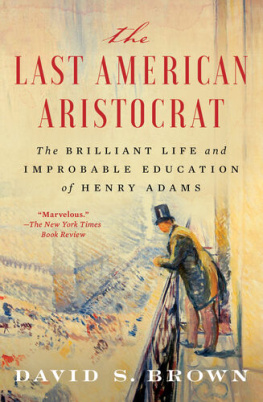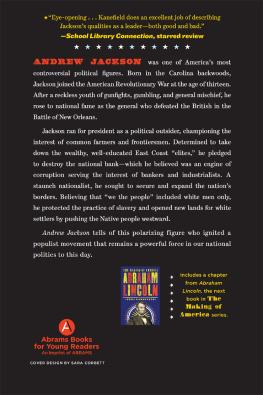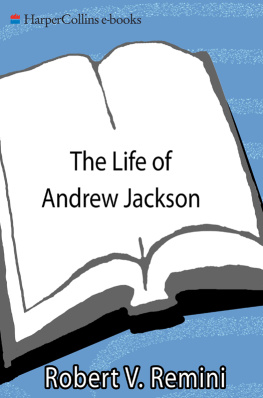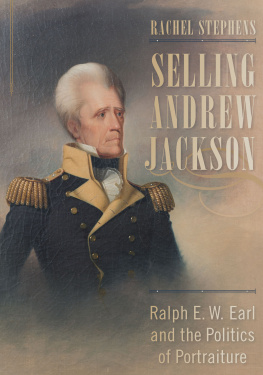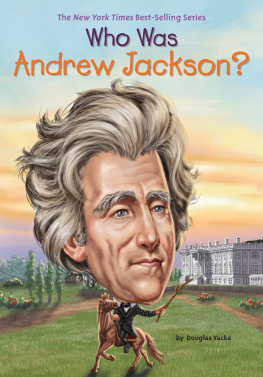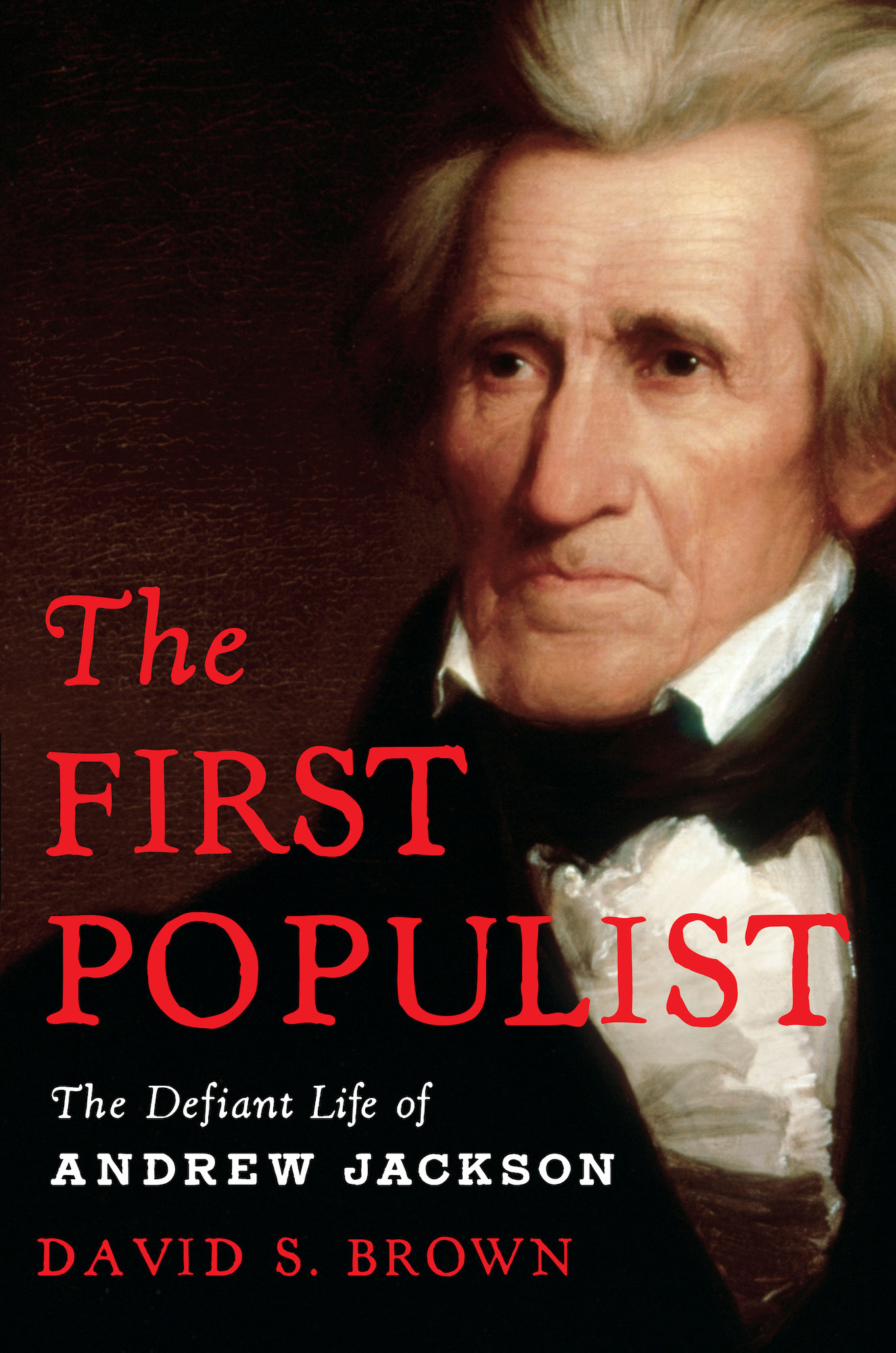Contents
Guide
The First Populist
The Defiant Life of Andrew Jackson
David S. Brown
For Bill and Suzanne
Bear me out in it, thou great democratic God! Thou who didst pick up Andrew Jackson from the pebbles; who didst hurl him upon a war-horse; who didst thunder him higher than a throne!
Herman Melville, Moby-Dick, or, The Whale, 1851
Introduction: The Populist Persuasion
It was the Peoples day, and the Peoples President and the People would rule. God grant that one day or other, the People do not pull down all rule and rulers.
Washingtonian Margaret Bayard Smith on Jacksons first inauguration, 1829
Andrew Jackson, the first president to be born in a log cabin, to live beyond the Appalachians, and to rule, so he swore, in the name of the people, refuses to fade away. Controversial in his own day, he remains unrepentant. Some identify him as the common mans crusader in chief, a defender of farmers and wage earners who, with a single lethal veto, is said to have saved the republic from a rapacious Money Power by quashing a government-chartered national bank catering to economic elites. Others are far less willing to accept as a hero a slaveholder, an architect of Indian removal, and a critic of abolitionism. The epithets racist, white nationalist, and ethnic cleansing, rather, now vie with the Bank War and the Battle of New Orleans in reckoning with Jacksons fluctuating reputation. On one point, however, all sides can perhaps agreeOld Hickory, the first president to come from neither Virginia nor Massachusetts, broke up the long train of coastal executive aristocrats, embodying in his improbable ascent the promise of western frontier peoples negotiating a natal age of expanding political participation.
More precisely, Jackson, a cotton nabob, master to hundreds of enslaved people in multiple states, in fact straddled two sections. As the countrys fifth southern president he aligned as well with the interests of an entrenched squirearchy, having sought entry into its environs from an early age. The orphan of impoverished Scots-Irish immigrants, Jackson strove to ape the gentry and become a gentleman among Tennessees self-anointed blue bloods. Along the way this parvenu acquired a plantation, bought and sold slaves, engaged in land speculations, and bred racehorses. He pushed for military appointment, fought in class-affirming duels, and more generally adopted a distinctly southern notion of honor that elevated landed nobility above mere citizens.
Two reflections of an aged Jackson by British womenthe visiting writer Harriet Martineau and the expat actress Fanny Kembleoffer contrasting but retrospectively revealing judgments. The former depicted the General as fundamentally ill-informed and uneducated, a poorly postured eminence betrayed by a trace of depression:
Jackson is extremely tall and thin, with a slight stoop, betokening more weakness than naturally belongs to his years. He has a profusion of stiff gray hair, which gives to his appearance whatever there is of formidable in it. His countenance bears commonly an expression of melancholy gravity; though, when roused, the fire of passion flashes from his eyes, and his whole person looks then formidable enough. His mode of speech is slow and quiet, and his phraseology sufficiently betokens that his time has not been passed among books.
Kemble, by contrast, more amiably emphasized the courtly, martial side of her subject, whom she described as
very tall and thin, but erect and dignified in his carriagea good specimen of a fine old well-battered soldier. His manners are perfectly simple and quiet, therefore very good. Of his measures I know nothing; but firmness, determination, decision, I respect above all things: and if the old General is, as they say, very obstinate, why obstinacy is so far more estimable than weakness, especially in a ruler, that I think he sins on the right side of the question.
Jackson, of course, cultivated both impressions. While Martineau stressed the unlettered side of her subject, Kemble, once described by the writer Henry James as having seen everyone and known everyone in two hemispheres, noted a natural patriarch, an air still more abundantly asserted by a cotton oligarchy committed to the appearance of chivalry in the practice of slavery.
Martineaus musing further underscores the surprising corporal frailty that trailed Jackson through most of his life. The generals cadaverous physique idled in pain and discomfort; his many ink-stained letters are filled with references to internal afflictions, ailing teeth, and weak lungs. Scarcely a hypochondriac, Jackson paid with his body for the chain of military campaignsfrom the American Revolution to the War of 1812 to the subduing of the southern Indiansand ritual affairs of honor that secured his redoubtable reputation. He suffered from dysentery, dyspepsia, and bronchiectasis, contracted chronic diarrhea, battled pulmonary infection and malaria, and may have carried intestinal parasites. His body lodged two bullets, one from a duel and the other received in a brawl, thus creating cavities prone to infection; the lead from these missiles leached steadily over the years into his system. Jackson bore the aches and inconveniences of these several infirmities for much of his life, and one cannot help but wonder if they exacerbated an already ingrained tendency toward cross and quick-tempered responses.
This splenetic cast of mood and attitude, formidable in Martineaus rendering and very obstinate in Kembles, is perhaps Jacksons defining emotional attribute. He could be a singularly devout and fierce hater, inspiring in turn the devout and fierce hatred of others. A series of pre-presidential episodesordering the deaths of deserting militiamen, killing a Tennessee dandy in a duel, and overseeing the executions of two British subjects while commanding a U.S. army sweeping illegally through Spanish Florida in pursuit of Seminolesprefaced a sequence of equally astonishing presidential actions. These included the violent removal of Indian peoples from their ancestral homes, asserting his right to enforce or ignore Supreme Court decisions, and firing off more executive vetoes than all of his predecessors combined. Cocksure in the extreme, Jackson found both essence and consequence trafficking in a world of enemiesmade, cultivated, and over the years assiduously accumulated. This congenital unquiet helps to place a couple of other antecedents in context, for Old Hickory is also the first executive to be targeted by a would-be assassin and the sole occupant of that high office to suffer a senatorial censure.
Drawn to these and other rare episodes of presidential Sturm und Drang, we too casually discount Jacksons real skills as a statesman. More polished and lawyerly than what the secondary literature suggests, he often read the public far better than Congress did. None of his vetoes were overridden; an unprecedented third term was his for the asking. As if caught between two worlds, a number of Washingtonians were surprised upon first encountering the legendary general, expecting something of a savage from the wild backwoods. A bemused Jacksonlike a wry coonskin capwearing Benjamin Franklin playing the rustic in Parisenjoyed the juxtaposition. An underrated politician, he knew well the length and limits of his personal popularity, courted easily the sudden electoral prominence of western constituencies, and managed to combine an aristocratic persona with a less posh public face.

